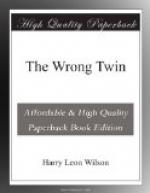The conference closed upon this. Dave left it feeling that he had eased his refusal into soft, ambiguous phrases; but old Gideon, reporting to Harvey D., said: “That chap hates a small town. What he really wanted to tell me was that he wouldn’t settle down here for all the money in the world. He really laughed at me inside for offering him the chance. He pities us for having to stay here, I do believe. And he wouldn’t talk of taking money for any enterprise elsewhere, either. He’s either independent or shiftless—both, maybe. He said,” Gideon laughed noiselessly, “he said he wouldn’t ever be able to feel free with our money the way he does with his own.”
* * * * *
The Whipples, it proved, would be in no indecent haste to remove their new member from his humbler environment. On Wednesday it was conveyed to Winona that they would come for Merle in a few days, which left the Penniman household and the twins variously concerned as to the precise meaning of this phrase. It sounded elastic. But on Thursday Winona was able to announce that the day would be Saturday. They would come for Merle Saturday afternoon. She had been told this distinctly by Mrs. Harvey D. Though her informant had set no hour, Winona thought it would be three o’clock. She believed the importance of the affair demanded the setting of an exact hour, and there was something about three o’clock that commended itself to her. From this moment the atmosphere of the Penniman house was increasingly strained. There were preparations. The slender wardrobe of the crown prince of the Whipple dynasty was put in perfect order, and two items newly added to it by the direction of Dave Cowan. The boy must have a new hat and new shoes. The judge pointed out to the prodigal father that these purchases should rightly be made with Whipple money. Dave needn’t buy shoes and hats for Merle Whipple any more than he need buy them for any other Whipple, but Dave had stubbornly squandered his own money. His boy wasn’t going up to the big house like a ragamuffin.
It came to the Wilbur twin that these days until Saturday were like the days intervening in a house of death until the funeral. He became increasingly shy and uncomfortable. It seemed to him that his brother had passed on, as they said, his mortal remains to be disposed of on Saturday at three o’clock. Having led a good life he would go to heaven, where he would have a pony and a thousand knives if he wanted them. The strain in the house, the excitement of Winona, the periodic, furtive weeping of Mrs. Penniman, the detached, uplifted manner of the chief figure, all confirmed him in this impression. Even Judge Penniman, who had been wont to speak of “them twins,” now spoke of “that boy,” meaning but the Wilbur twin.




